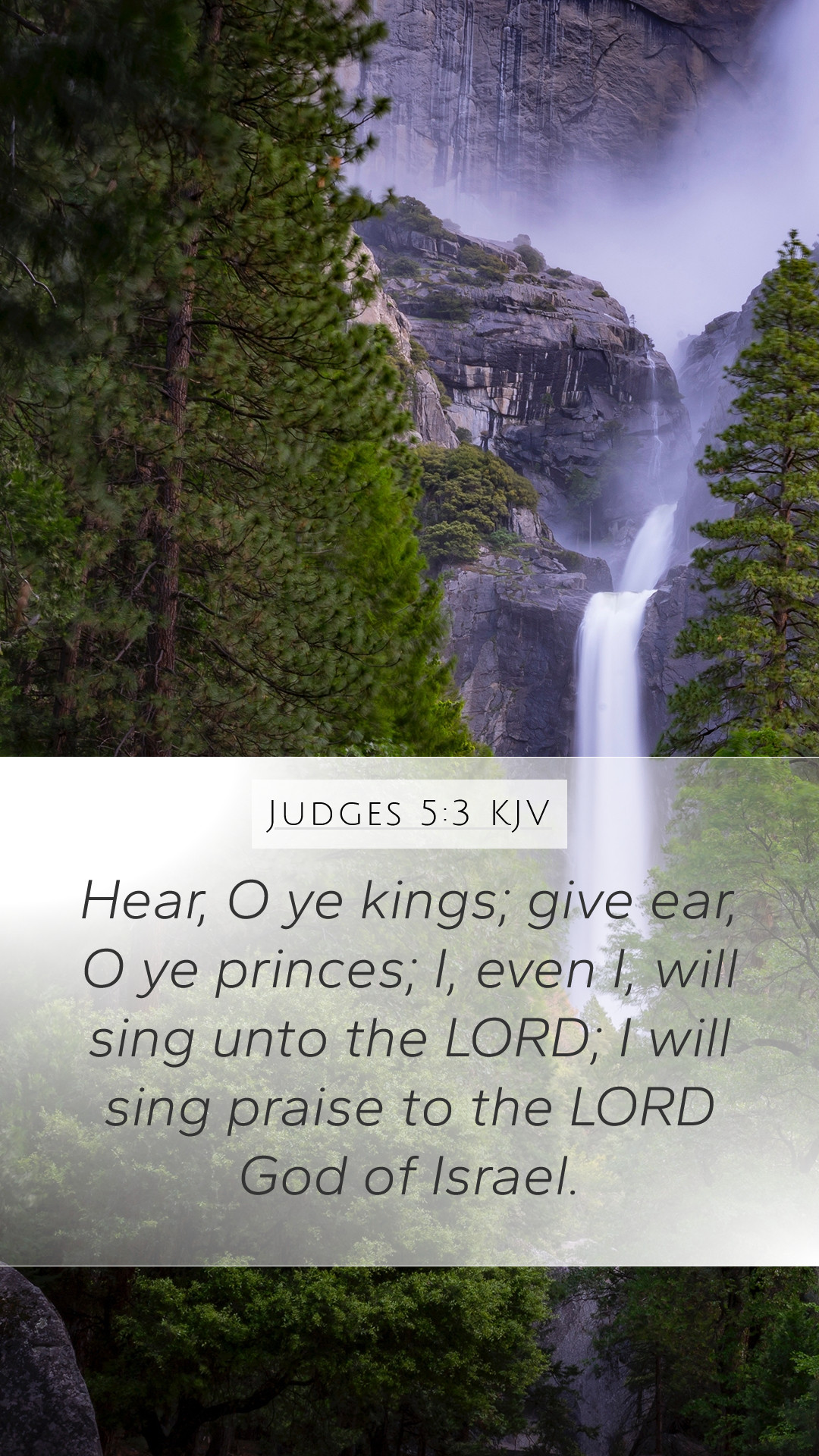Understanding Judges 5:3 - A Comprehensive Bible Verse Explanation
Judges 5:3 states, "Hear, O kings; give ear, O princes; I, even I, will sing unto the LORD; I will sing praise to the LORD God of Israel." This verse is part of the song of Deborah, celebrating the victory of Israel over their enemies, specifically the Canaanites. Below, we provide an essential commentary derived from respected public domain commentaries, such as those by Matthew Henry, Albert Barnes, and Adam Clarke, to enhance your understanding of this scripture.
Contextual Background
This verse occurs at a pivotal moment in the Book of Judges, where Deborah, a prophetess and judge of Israel, leads her people in song after a great military victory. The context is crucial for interpreting the verse accurately, as it reflects both a literal and metaphorical call for recognition and praise towards God.
Verse Breakdown
-
"Hear, O kings; give ear, O princes;"
This address signifies a call for attention not only from Israelite leaders but also from the surrounding nations' rulers. It is an invitation for them to witness the power and sovereignty of the God of Israel.
-
"I, even I, will sing unto the LORD;"
Deborah emphasizes her personal commitment to worship. It illustrates the importance of individual devotion within the communal setting of Israel's victory, highlighting that worship is both a personal and collective act.
-
"I will sing praise to the LORD God of Israel."
This phrase underscores the primary focus of the song: thanksgiving and recognition of God's role in Israel's deliverance. It serves as a reminder of God's faithfulness during times of struggle.
Bible Verse Meanings from Commentaries
Several commentaries provide insights into the key themes and meanings behind Judges 5:3:
Matthew Henry’s Commentary
Henry emphasizes the courage of Deborah and Barak in leading Israel into battle, noting that this song is a means to glorify God. He highlights that their victory is a testament to God's righteousness and a call for other nations to recognize His power.
Albert Barnes’ Notes on the Bible
Barnes points out the significance of Deborah’s song in the historical context of Israel. He notes that it serves to commemorate not only the military success but also to instill faith in future generations regarding God’s intervention on behalf of His people.
Adam Clarke's Commentary
Clarke analyzes the poetic structure of the song, noting its call to both rulers and ordinary people. He explains that this opening verse sets the stage for examining Israel's national narrative, highlighting God’s sovereignty and the communal aspect of worship in response to divine aid.
Key Takeaways for Bible Study
This verse serves multiple purposes in personal and communal Bible study contexts:
- Call to Worship: It emphasizes the importance of acknowledging God’s role in our lives, urging individuals and groups to engage in worship.
- Collective Memory: It reinforces the idea that remembering past victories can strengthen faith in current and future challenges, making it valuable for Bible study groups.
- Encouragement for Leaders: The verse serves as an encouragement for leaders to recognize their divine responsibility in guiding their communities toward acknowledgment of God’s greatness.
Cross References
- Exodus 15:1-2: The Song of Moses, celebrating God’s deliverance after the crossing of the Red Sea.
- Psalm 68:32-33: A call for nations to recognize God and His power.
- Revelation 15:3-4: The song of the Lamb signifies ultimate victory and praise to God.
Conclusion
Judges 5:3 encapsulates a profound moment of recognition, celebration, and worship within the narrative of Israel's tumultuous history. Through the insights of Matthew Henry, Albert Barnes, and Adam Clarke, we gain a richer understanding of how this verse invites us into a deeper relationship with God and challenges us to recognize His hand in our everyday lives.
Further Study Resources
If you're interested in delving deeper into the understanding of Scripture, consider exploring:
- Bible study guides: These can help you walk through chapters and verses systematically.
- Online Bible study courses: Interactive platforms can offer guided insights and community discussions.
- Bible study tools and materials: Resources such as commentaries, dictionaries, and atlases enhance your research and application.
Final Thoughts
Engaging with Bible verse interpretations like Judges 5:3 enriches our understanding of God's nature and His actions in history. As we reflect on these themes in our personal and communal worship, may we also find ways to apply the lessons of this ancient text in our modern lives.


